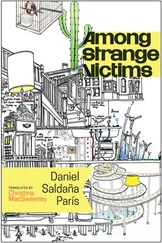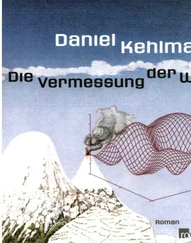“Finally!” he calls.
There are two men with ties in the elevator, and the mirror on the wall multiplies us into an army.
“Are there statistical investigations?” asks Eric. “Into horoscopes and people’s lives? Do things come out the way astrologers predict? It should be possible to clarify that statistically. Do you know anything about it?”
“How should I know anything about it?”
“But you make horoscopes!”
“No!”
“No?”
“Horoscopes are sheer nonsense!”
“You don’t make horoscopes?”
“Is that supposed to be a joke?”
He pulls out his phone, taps on it, and puts it back in his pocket. The elevator stops, we get out. I can hardly keep pace with him. We cross the lobby, the glass doors open, I collide against a wall of pure heat. He crosses the street, just like that, looking neither right nor left. A car honks, he pays no attention. Luckily the restaurant is right on the opposite side. I couldn’t go any farther in this temperature.
It is an elegant place: linen cloths on the tables, lamps shaped like glass drops, waiters in black shirts, and, thank God, air-conditioning. Eric heads for a small table, jammed in between two other small tables in front of a leather banquette along the wall. Not a good idea, but how can I explain this to him? The waiter has already pulled out the table, Eric steps to one side, so there’s no option but for me to sit on the banquette between two men in suits who glower at me, their disapproval of my bulk only partially tempered by respect for the cloth. The waiter pushes the table back into position, Eric sits down opposite me and says, “The usual.” The waiter hurries off before I can contradict him. Where does Eric get the idea he can order for me?
He looks at his phone, taps it, puts it away, and stares at the wall behind my head. Then he picks up the phone again.
“How’s the economy doing?” I ask.
“What?” He’s tapping away, not looking up.
“How’s the economy? Do you have a prognosis?”
“Prognosis?” He taps. “No.”
As always, people all around the room are looking at me surreptitiously. I’m used to it. If they were to see me at the head of a procession, they would think nothing of it, and nor would they regard it as odd if I were discussing questions of morality on TV. But seeing me just sitting there in a restaurant like this with a glass of water in front of me, facing a businessman staring fixedly at a phone, strikes them as curious. Many of them feel comforted by the fact that people like us still exist — that we still walk the earth, saying Mass, praying, and behaving as if man had a soul and there was hope. I feel it myself when I see priests I don’t know.
The waiter brings the food. The portions are even smaller than I had feared. A minuscule heap of tangled threads of pasta and mussels in the center of a more or less empty plate.
Eric puts the phone away. “If you send someone a message and he answers and you answer back and ask for a quick reply, and none comes, would you assume he didn’t get the message or that she’s simply not answering?”
“He or she?”
“What?”
“You said ‘he’ and then you said ‘she.’ ”
“And?”
“Nothing.”
“What does that have to do with my question?”
“Nothing, but—”
“What do you want to know?”
“Nothing!”
“It doesn’t matter what kind of message. It’s irrelevant.”
“And that’s not what I asked.”
“Perhaps it’s all part of what you do. Perhaps you have to be so curious.”
“But I’m not curious!”
He stares at his phone, taps on it, and ignores me. That’s fine by me, because the dish is proving so complicated that I have to concentrate. It defies all reason that you’re not allowed to cut noodles. A commandment that carries quasi-religious authority. Cutting noodles would be a gigantic misstep. Why? Nobody knows. And mussels? You have to pull open every shell and then extract the tiny, tasteless lump of stuff. It’s hard enough with your fingers, even harder with a fork.
“Do you still conduct exorcisms?”
“Do we …?”
“Demonic possession. Do you still do that? Do you have people for that?”
“I don’t know. It’s possible.”
He nods, as if my answer confirms a suspicion.
Eric hasn’t yet touched his food. I open the last shell, sauce drips onto my sleeve, then I concentrate on the noodles, but it’s not easy, the plate is full of broken mussel shells. My fingers smell of fish. And my neighbor on the banquette keeps jabbing me with his elbow, he’s gesticulating wildly. He’s facing a man with a bald head and glasses; the two of them are discussing the credit rating of a fixed-income fund.
“What’s the classic school of thought?” asks Eric. “Do you have to let a demon in if he comes? Does he need an invitation, or can he just take possession of someone?”
“Why do you want to know?”
“A book, just a book. I read this book. A strange book. Never mind.” He picks up his glass of water, looks at it, takes a sip, and puts it down.
“So, what did you want to talk to me about?”
He frowns and looks at his phone. I wait. He says nothing.
This is gradually becoming exhausting. I pull out my phone, tap in a message: How are you, call me if you have time! Martin , and I send it to Eric.
He’s just put down his phone. It vibrates, he reaches out and looks at it and raises his eyebrows. I wait, but he doesn’t say a word. He doesn’t smile either. He rubs his brow, puts down the phone, picks it up, puts it down again, and says, “This heat!”
I admit it wasn’t the wittiest joke, but a brief smile would not have been amiss. Why does he find it so hard to be polite?
“How’s Laura?” I ask. I barely know his wife. An actress, what else. Very good-looking. What else. “And Marie?”
“She’s doing well in school. Sometimes I worry about her.”
“Why?”
“Sometimes I worry about her. But she’s doing well in school.”
“And your mother?”
“She’s got this TV program now. People call in, talk about their illnesses, and she comments.”
“I thought she was an eye doctor.”
“There was an audition, three hundred doctors, and she won it. She gets good ratings. And your mother?”
“Healthy. Thank God. Retirement suits her, she reads everything she always wanted to read.”
“Do you still live with her?”
I look at him to see what he’s thinking. But why should I keep it a secret? The hours I spend with Mama are bright and peaceful, the best hours of the day. We eat cake, sitting facing each other, we don’t talk much, we wait for evening to come. What’s bad about that? “I live at the presbytery, but I visit her often.”
“Every day?”
“Are you still eating your pasta?”
He looks at his untouched plate as if it’s the first time he’s seen it. But before he can answer, a man stops behind him, bares his teeth, and claps him on the shoulder. “Friedland!”
Eric jumps up. “Remling!” He pretends to box the man in the stomach, while the man holds Eric’s upper arm tight. Both of them laugh awkwardly.
“Do they let just anyone in here?”
“As you can see!”
“Everything okay?”
“Obviously. And you?”
“Absolutely.”
“That last game! A disgrace!”
“Madness!”
“I wanted to shoot myself! This is my brother.”
Remling looks at me. A fleeting look of surprise passes over his face: the usual look people get when they find themselves unexpectedly face-to-face with a priest. He holds out his hand, I reach out too, and we shake hands.
Then the two of them stare blankly into nothing. Obviously neither of them can think of anything to say.
Читать дальше











